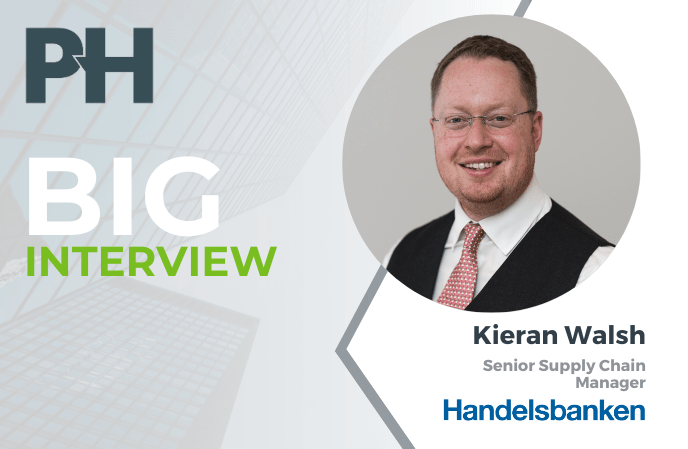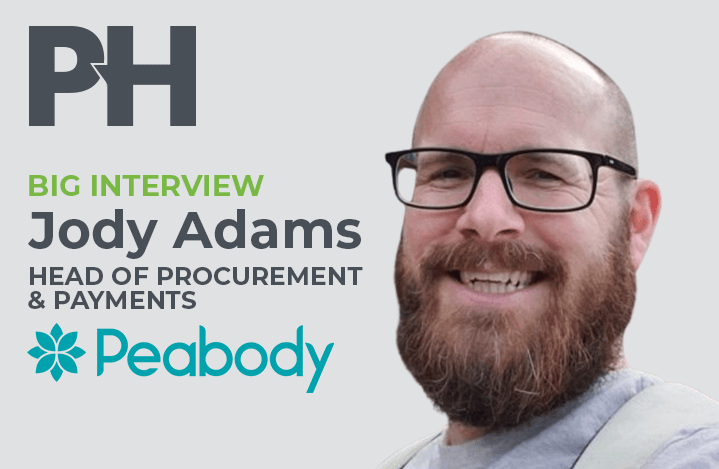The journey of a Procurement Professional, driving change in the Financial & Professional services sector. Will Cooke, interviews Kieran Walsh MCIPS
Dive into the intricate world of modern procurement with Kieran Walsh, an accomplished professional with a wealth of experience. From his unexpected entry into the field to leading strategic initiatives at Handelsbanken, Kieran shares valuable insights into the roles, challenges, and future trends shaping the procurement landscape today.
How did you get into Procurement?
Purely by accident, I think many of us find ourselves falling into it. I was working in a lot of office manager roles and assistant office manager roles at the time, working in the government sector and moved across to the national police and improvement agency. I found my first role as a senior administrator and an opportunity came up to work alongside the contract management team and being able to work with them was really what started it all off in 2005.
What are the roles and responsibilities the Procurement function holds at your current organisation and how do you split the function out?
The function within Handelsbanken has really grown throughout the last year and a half now. The head of the function is effectively split into three core areas, we have a head of governance and sustainability, a head of third-party risk management and then a head of supply chain management. Within supply chain management we really focus on three key areas; at the moment it is source to contract and then during the contract life we also do supplier relationship management and then the category expertise discipline. That is how we have structured the team and the people we have today.
What are some of the challenges that you and your team are currently facing?
Commonly, the biggest one is building the road map. So, it is really understanding our customers. What are their future needs? As the team itself is still relatively young within the bank, this is one of the challenges we have as far as really getting to know our customers so we need to get that information from them. So as far as ourselves to ensure we have the right skills and capabilities to allow us to pivot and help them when they need us.
What are you most passionate about when it comes to Procurement?
I quite like the serenity of fixing a problem. I am passionate about having someone come to you with a particular challenge they have got and helping them to break it down and creatively understand how they can achieve what they want to do. Whether it is outsourcing a call centre solution, buying stationary, or doing a refit on a facilities management activity.
What do you think are some of the key focus areas for Procurement right now?
I think key focus areas are data analytics and data analysis – the richness of the information we are able to get is close to it being live as possible, helps inform senior management make better decisions. Or even ourselves in terms of how we engage the market to better bring that insight back to our customers.
What do you look for when hiring?
For me it is always that balance between softer and technical skills. I am always in the camp of you can teach someone a process. The more senior the role, naturally the more experience I will expect someone to have had. But the softer skills are absolutely paramount. For me it is about being articulate, being able to build and foster relationships with stakeholders whether that is internal or external. IT is about an individual’s brand, their integrity. It is committing to delivery timelines, being able to have conversations and influence seniors. Being able to drive sometimes what that need is and that policy scene-setting.
What are your team and organisation doing with regards to sustainable Procurement?
Sustainability is definitely a large focus area for Handelsbanken and we have an entire department that does look after that an invest in it. In the Procurement function it falls down to supporting the bank’s initiative to be carbon neutral by 2040. Looking at policy areas such as the modern slavery statement and making sure that filters through into our supplier relationship management activity. Living wage etc and being able to work and foster those relationships with suppliers to drive some of that out better.
What is the biggest risk you have taken in your career?
For me I think it was moving from government and public sector into private sector. I grew up at a time when the workforce where there was a lot of kudos and credentials being able to demonstrate you have worked in the private sector. They were leaner, quicker, they drove out commercial deals. Government Procurement was seen very much as process orientated and it felt like a really scary alien to me. I had had some really great managers beforehand helping guide and shape my path and where I needed to focus my energies and an opportunity came up with a previous employer to go and work with them in their evolving greenfield procurement team. That was my first fall into the private sector, and it has been a really great learning opportunity.
What would you say inspires you as a Procurement leader?
For me it is the team I work with. Seeing how dedicated they are and the amount of time they invest in nurturing their relationship with their customers and being able to build and foster and draw out those demand pipelines and seeing them tackle those problems coupled with my desire to want to work on larger, more complex areas and tackle some of the more difficult challenges is what really inspires me to lead the team.
What skills do you consider essential to be a Procurement leader?
Chiefly, it is being able to articulate the strategy into objectives that both the team and those around them are able to grasp and help the organisation deliver its aims and objectives. Otherwise, it is being articulate, it is being a promoter. Within the industry we are not great at being able to sell what it is that we do and the differences that we make so it is investing time in doing that. Also, it is being a defender. At times when the Procurement team come under pressure, it is providing them with an umbrella that allows them to focus on delivery. Whilst my role is about being able to navigate and liaise with senior leads to really be able to focus on and sell the success of what we do and the value we bring to the organisation.
What advice would you give to someone embarking on a Procurement career?
No matter where you are in your career journey, if you are looking to get into Procurement the key thing is relationships. As it is in most other professions, so it is about building that rapport, establishing your brand, it is being able to front up where you can’t deliver for whatever reason. Then it is also being able to spend time on your network, so building relationships with other people, other professionals, you won’t know everything so the guide here is being able to bring expertise into those situations and into those projects as and when it is needed.
How do you see AI and robotics effecting Procurement?
It is a really interesting space at this time. There is a fair amount of nervousness in some corners that AI and robotics will effectively result in a large number of layoffs but I don’t personally feel that that is the case. AI and robotics will be a great leap forward in terms of helping our own function effectively tackle otherwise quite administratively and resource heavy aspects of the process. What it will then do is release those resources and that time and energy to allow us to focus more on market insight, market engagement, building rapport and relationships, looking at category strategies. The benefit of having people and robotics is AI can do a lot of that data analysis and scraping but interpreting it, overlaying it with the context of your organisation, your programmes and projects is where we will be able to step up further and deliver value.
What do you like doing in your spare time?
For me I like to travel, I like to eat out and I like to go to the theatre. IT is about being able to relax and lose myself in some of those more exotic locations that we continue to hope for. I am definitely in the mentality of work to live.
If you could give any advice to your younger self, what would it be?
Don’t be afraid of making mistakes. The benefit I have had is that I have worked with some really great managers in the past where I have stumbled and I have mis-stepped and as opposed to being drawn out or unduly chastised, the ability to learn or understand why it went wrong. It is ok.
Can you tell us an interesting fact about yourself?
I was successful in a baking competition, I was awarded a bottle of champagne by the then chancellor, George Osborne. That was my limited claim to fame and very interesting fact about me! I baked a carrot cake!
Explore the full Big Interview series on our insights page





